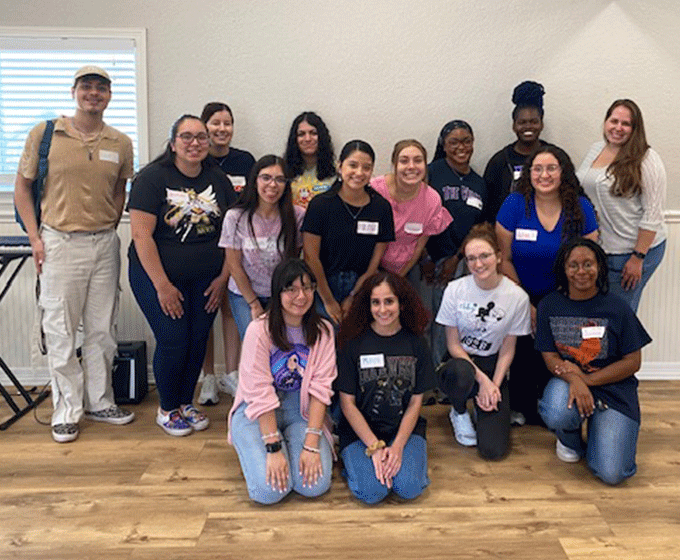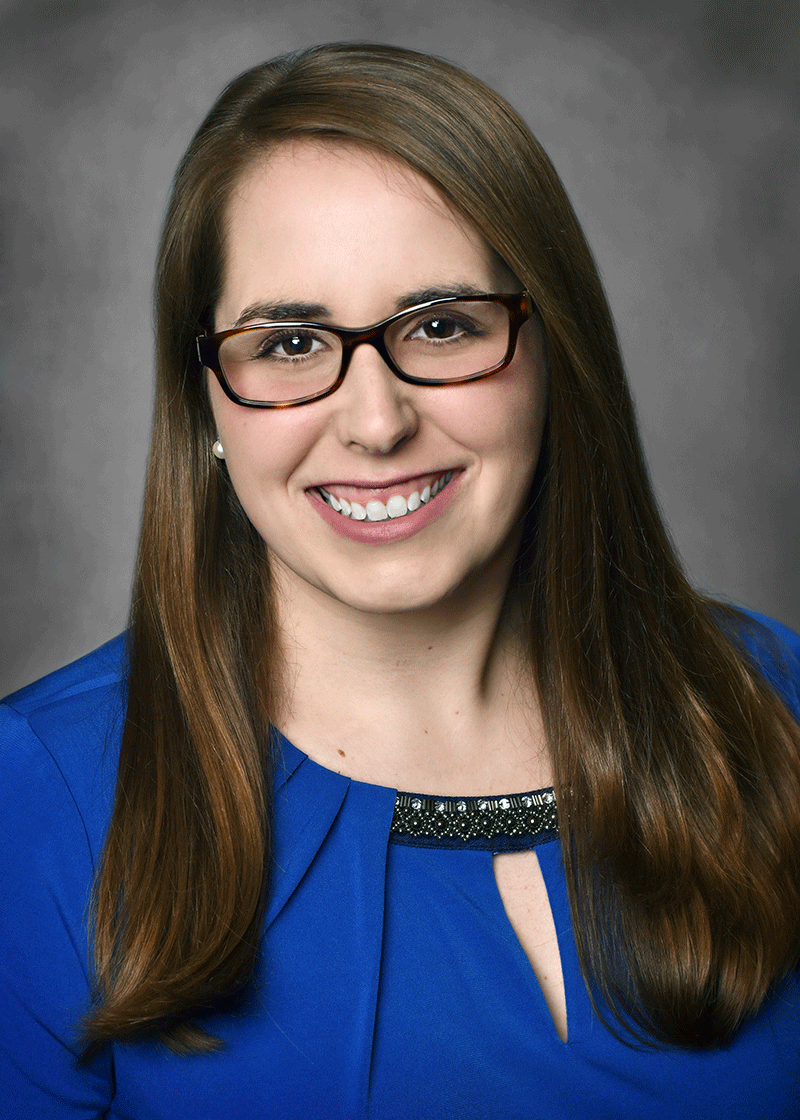
Psychology students in a childhood trauma class at UTSA are getting real-world training with youth affected by trauma and homelessness at a residential foster care facility in San Antonio.
SEPTEMBER 27, 2023 — UTSA Assistant Professor of Psychology Monica Lawson has developed a childhood trauma class with an experiential learning component. She and her students are partnering with a residential foster care facility in San Antonio to give students hands-on training with youth affected by trauma and homelessness.
The course, offered through UTSA College for Health, Community and Policy (HCAP), includes research-intensive classroom time and weekend visits to SJRC Texas. Founded in 1983 as St. Jude’s Ranch for Children – Texas Region, SJRC is a trauma-informed, accredited agency that cares for children and families who have been affected by trauma, abuse or neglect. Currently, UTSA students are working with their residential program, Touchstone, which provides behavioral, mental health and physical health services for high acuity youth.
SJRC Texas has been in the child welfare system for more than 40 years. They provide foster care, adoption services, residential programs, parenting and prevention programs and community-based care. They have served more than 70,000 children in various programs since its inception. Currently, UTSA students are working with a population ranging from age 13 to 18.
Child abuse and neglect is a problem nationwide, including cities like San Antonio. According to ChildSafe, San Antonio continues to have the highest rate of confirmed child abuse cases amongst all major metropolitan Texas cities. Last year, there were more than 5,000 cases of child abuse and neglect reported in San Antonio.
 Monica Lawson
Monica Lawson“Child abuse and neglect is a major national and international crisis,” Lawson said. “We would need nearly 100 NFL stadiums seated to capacity to hold the seven million children reported to child protective services for suspected abuse and neglect each year in the United States. We would need nearly two Frost Bank Centers to hold all the children reported for suspected abuse and neglect in Bexar County alone during a one-year period. This is a top priority, so we are working with this population to help them and preparing the workforce to handle this growing issue.”
The UTSA class and field work will help students learn more about trauma and build skills for positive interaction with this population. For example, every student learned about mandated reporting, the do’s and don’ts of confidentiality and challenges that they may face working with foster care youth.
“The sad reality is that experiences of trauma are very common. Psychology students are often very interested in trauma and want to understand and help others to heal from those experiences,” Lawson said. “I wanted to teach this class to help students gain a deeper understanding of the causes and consequences of trauma, including risk and protective factors, and gain hands-on experience helping youth to heal from trauma, even if in an informal way.”
Classroom work will rely heavily on studying journal articles and primary source documents, enhancing students’ research literacy and illustrating how to translate real studies into a research-paper format. On weekends, students visit SJRC to work with foster care youth living in their residential facility.
“UTSA students will engage in structured therapeutic activities with our residents, such as painting, cooking, arts and crafts, board games and more,” said Laura Rendon-Lopez, vice president of residential services at SJRC Texas. “(Students and residents) will attend a UTSA football game together and hopefully the students will schedule a picnic on the UTSA grounds so our residents can be exposed to a college campus. Our goal is to provide our teenagers with opportunities to help them identify leisure skills that bring meaning and enjoyment to their lives while providing them with an opportunity to build social skills through healthy engagement with the UTSA students.”
Students will also benefit from the experiences of guest speakers—including individuals from various child welfare agencies in Bexar County and international experts in child maltreatment research.
“The purpose of bringing in guest speakers is for students to learn more about working in the child welfare field from expert perspectives and to increase classroom-to-career readiness by learning about careers in the child welfare field,” Lawson said. “Speakers will also discuss opportunities at their organizations for volunteering and internships.”
In addition to the hands-on benefits UTSA students will receive, Lawson hopes that residents’ futures are positively impacted. Only about 3% of foster care youth attend higher education institutions, according to the National Foster Youth Institute. By interacting with current UTSA students, residents may see opportunities for themselves they hadn’t considered before.
“We know from research that children who have caring and responsive relationships with others are better able to recover from trauma,” said Rendon-Lopez. “We believe this collaboration will provide mutually beneficial connections for both our youth and the UTSA students that will have a lasting impact.”
The class has garnered tremendous interest. The initial application pool contained over 130 applications for 25 spots. Lawson hopes to continue and expand this course in years to come.
“The extensive work that Dr. Lawson has put into creating this amazing experiential learning opportunity shows in the student interest—130 applications for 25 spots makes this a very competitive course,” said Lynne Cossman, dean of the college. “Not only is it critical to understand childhood trauma, particularly in foster settings, it is imperative for our students to have these real-world experiences.”
Lawson had wanted to teach this class since before arriving to UTSA. She formally began working on the framework for this class in November of 2022. Now that the class is up and running, she sees it as a perfect fit for the college and its mission to develop solutions for complex social issues to improve the well-being of communities.
“This class really aligns with the mission and vision of HCAP,” Lawson said. “It’s great to have a college that supports this important work.”
UTSA Today is produced by University Communications and Marketing, the official news source of The University of Texas at San Antonio. Send your feedback to news@utsa.edu. Keep up-to-date on UTSA news by visiting UTSA Today. Connect with UTSA online at Facebook, Twitter, Youtube and Instagram.
Move In To COLFA is strongly recommended for new students in COLFA. It gives you the chance to learn about the Student Success Center, campus resources and meet new friends!
Academic Classroom: Lecture Hall (MH 2.01.10,) McKinney Humanities BldgWe invite you to join us for Birds Up! Downtown, an exciting welcome back event designed to connect students with the different departments at the Downtown Campus. Students will have the opportunity to learn about some of the departments on campus, gain access to different resources, and collect some giveaways!
Bill Miller PlazaCome and celebrate this year's homecoming at the Downtown Campus with food, games, giveaways, music, and more. We look forward to seeing your Roadrunner Spirit!
Bill Miller PlazaThe University of Texas at San Antonio is dedicated to the advancement of knowledge through research and discovery, teaching and learning, community engagement and public service. As an institution of access and excellence, UTSA embraces multicultural traditions and serves as a center for intellectual and creative resources as well as a catalyst for socioeconomic development and the commercialization of intellectual property - for Texas, the nation and the world.
To be a premier public research university, providing access to educational excellence and preparing citizen leaders for the global environment.
We encourage an environment of dialogue and discovery, where integrity, excellence, respect, collaboration and innovation are fostered.